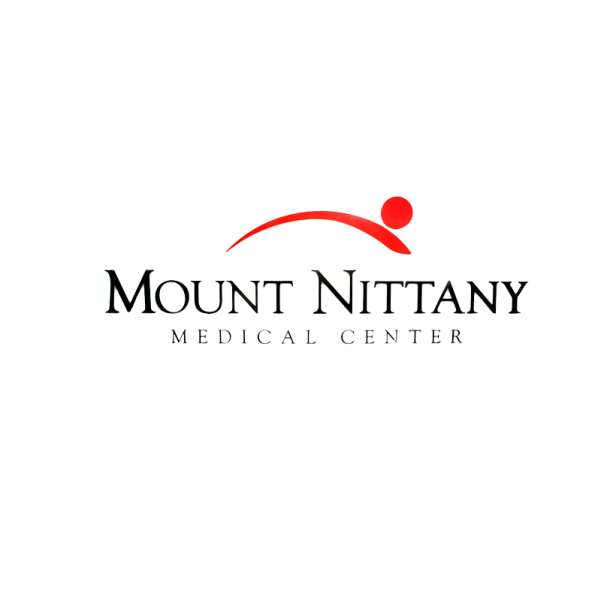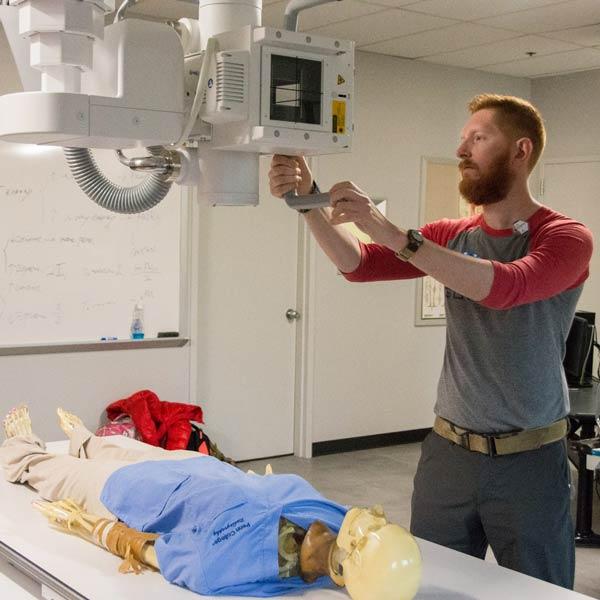Facilities
Modern, Fully Equipped Lab
Develop your skills in our state-of-the-art labs, featuring a fully energized digital radiographic imaging suite and a human phantom for true-to-life imaging experience.
Careers in the healthcare field are in-demand—and radiography is no exception. At Penn College, you’ll study how to harness the power of radiographic technology to improve patient care. An immersive hands-on experience, this fully-accredited program includes 1,500+ hours of training in clinical settings. Apply technical skills in our fully energized digital radiographic imaging suite and in guaranteed clinical rotations across three systems to ensure depth of experience. And when you become a registered radiographer, you will join other allied health professionals educated and experienced in the latest technical procedures requiring the use of X-rays and other imaging modalities for the diagnosis of medical conditions.
Acceptance in this major is based upon additional requirements beyond College admission.
Cohort size may vary based on clinical site availability and alignment with accreditation requirements. Students who are not selected into their desired program may be eligible for selection into another NHS program depending on seat availability. For additional information, please contact the appropriate program director.
Next steps...
You're on your way to becoming a tomorrow maker.
At Penn College, we believe your educational experience should go beyond specialized skills. Real-world ready means taking a broader approach that builds communication skills, inspires collaboration, and encourages exploration of arts, history, and science.
Specialization requires in-depth knowledge and high-level proficiency. Students learn and apply major-specific concepts, skills, and methods.
Perspectives are points of view, offering a variety of ways of understanding, interacting, and influencing the world. Students identify, explain, and utilize the approaches used by academics and professionals to study, analyze, or understand problems, and offer solutions.
Foundations are the practical, intellectual, and social skills: communication, collaboration, critical and ethical thinking, quantitative thinking, and technological literacy that are crucial to every student at every stage of education and at every stage of life.
Take a walk through the expansive radiography lab where you'll get hands-on experience with the latest technology and equipment just like you'll see in the real world.
Develop your skills in our state-of-the-art labs, featuring a fully energized digital radiographic imaging suite and a human phantom for true-to-life imaging experience.
Think Penn College might be a good fit for you? Make plans to visit and discover what hands-on learning is all about.
Oct 5
Undergraduate Open House
Saturday, October 59 AM - 3 PM
Nov 3
Undergraduate Open House
Sunday, November 39 AM - 3 PM
Penn College's strong partnerships impact every step of your journey – from your first day in the classroom and labs, to career placement (oftentimes before graduation) and beyond.




Enhance your college experience and professional knowledge through peer and public interaction.
Your college experience is about more than the classroom. Join one of 65+ clubs and organizations, or create your own.
See the world via Williamsport. Take your education abroad and get hands-on experience learning about your industry on a global scale.
With 1,500+ hours of experience in the clinical setting, you’ll be ready to hit the ground running upon graduation.

Students who have earned an associate’s degree from Penn College in radiography are eligible to pursue a bachelor’s degree in healthcare leadership & administration. Students currently enrolled in the radiography program may work with their advisor to declare this major as dual degree, taking both radiography courses and healthcare leadership & administration courses simultaneously. Proof of the appropriate credential or associate degree in radiography will be required to be eligible for graduation in the healthcare leadership & administration major.
Jennifer Nicholson, a radiography student, finding common ground with a patient she met during a clinical experience at a local hospital, made a trip to New York City that she’ll likely never forget. Nor will the World War II veteran she accompanied.
The Radiography major is accredited by the Joint Review Committee on Education in Radiologic Technology, 20 North Wacker Drive, Suite 2850, Chicago, IL 60606-3182, (312) 704-5300; www.jrcert.org ; email: mail@jrcert.org.
View Radiography Accreditation & Outcomes Information
The Radiography major is accredited by the Joint Review Committee on Education in Radiologic Technology, 20 North Wacker Drive, Suite 2850, Chicago, IL 60606-3182, (312) 704-5300; www.jrcert.org; email: mail@jrcert.org
Accrediting Documentation:
View Radiography Accreditation & Outcomes Information which includes
In compliance with JRCERT Accreditation Standard 1.6, the Pennsylvania College of Technology radiography program posts the pass rates of the National Registry exams, job placement rates, and in-program attrition/retention. All information is verifiable and consistent with the program's JRCERT annual report. See results.
Anyone desiring entrance into this major must first gain admission to Penn College. Acceptance into this selective admission major is based upon additional requirements beyond College admission. Details are available on the Selective Admission Criteria and Process webpage. Due to federal guidelines, students under the age of 18 will not be allowed to begin clinical education.
All students are required to maintain a cumulative graduation GPA of 2.0 or higher to remain in the major. In addition, all students must earn a “C” (2.0) or higher in all RAD, MTH, and BIO courses and PHS222. If a lower grade is earned in any of these courses, the course must be repeated. The following grading system is applied to all radiography (RAD) courses in this major. There is no rounding of grades:
A = 90-100
B = 80-89.99
C = 75-79.99
F = 74.99 and below
Child abuse clearances and criminal background checks are required for this major as established by clinical affiliation agreements. Agencies can prohibit students from participating in clinical experiences at their sites if a criminal record exists or a positive drug test is noted. By virtue of contract for Pennsylvania College of Technology students to be at clinical sites, agencies have the right to ask for random drug testing. Inability to complete clinical, fieldwork, or intern educational experiences will result in the inability to meet course and program outcomes. For additional clarification, students can speak with their program director.
PLEASE NOTE: The American Registry of Radiologic Technologists (A.R.R.T.), the organization through which certification is obtained upon completion of the Radiography program at Pennsylvania College of Technology, reserves the right to refuse registration/licensure to those individuals who have been charged or convicted of certain types of crimes. The ARRT may deny a person who has previously passed a criminal background check required at this school for clinical purposes. If you have ever been charged or convicted of a crime, even if adjudicated, it is strongly recommended that you contact ARRT to have your situation evaluated prior to starting your education to ensure you will be permitted to sit for the registry. Students can contact their program director or contact ARRT at: American Registry of Radiologic Technologists, 1255 Northland Drive, St. Paul, MN 55120-1155, (615) 687-0048, www.arrt.org
Penn College complies with the federal Drug-Free Schools and Communities Act Amendments of 1989.
This major is subject to the transfer standards established by the College (see http://www.pct.edu/catalog/TransferringCredits).
International health credentials/licensure, sciences courses, and most math courses will not be accepted to satisfy requirements of this major. Please see additional information for international students applying to Health Sciences majors.
Alternative Credit refers to academic credits earned through means other than traditional college course completion, including: credit by exam, articulation, proof of competency gained in high school, work/life experience, and advanced placement.
Visit the Alternative Credit Options page for requirements and procedures and for information on credit through Advanced Placement.
The radiography program’s faculty and staff are committed to helping students succeed academically. Additionally, students requiring assistance have a number of resources and locations across campus to which they can turn:
Students accepted into the Radiography major will incur expenses for instruments, uniforms, malpractice insurance, clearances and certifications, etc. See the complete list.
The radiography program at Pennsylvania College of Technology meets the didactic and clinical competency requirements for the American Registry of Radiologic Technology (ARRT) certification examination and Radiologic Technology credential, which meets the requirements for the state of Pennsylvania. The College has not determined if the program meets the state education requirements in any other state, any U.S. Territory or the District of Columbia where state licensure is required. However, the ARRT exam scores and/or credentials are accepted by most states for licensure. Students intending to seek employment in a state other than Pennsylvania are asked to contact the program office so that we can help you determine whether our program meets the requirements of that state.
Penn College graduates are in high demand. Employer participation at the Career Fair is proof. Attracting 400+ organizations, this popular event is hosted twice per year and introduces students to all types of businesses from startups to Fortune 500 companies.